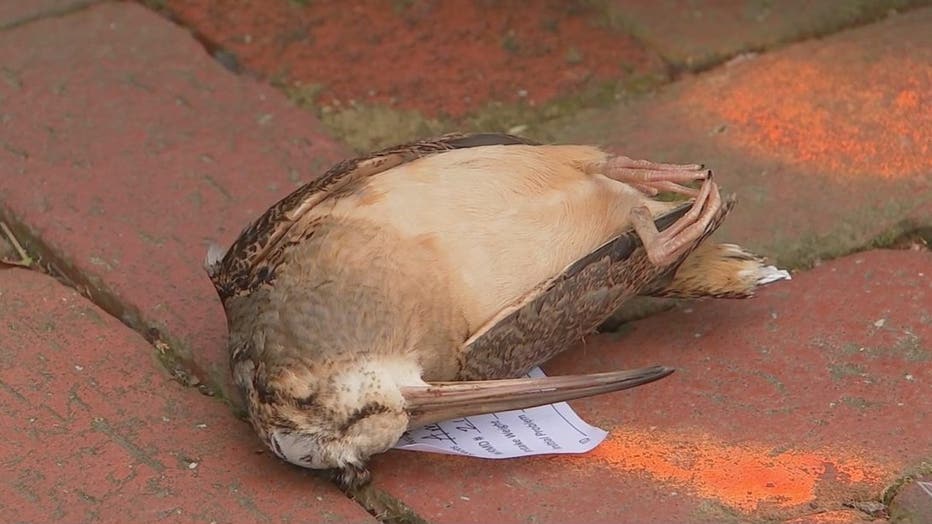Bill aims to curb bird deaths in DC
Bill could require bird-friendly buildings
Dead birds on D.C. sidewalks are a larger problem than most realize.
Dead birds on D.C. sidewalks are a larger problem than most realize. Hundreds of thousands of birds are dying each year and now there’s a bill to help stop it from happening. It's called the "Migratory Local Wildlife Protection Act of 2022."
The bill aims to address birds flying straight into a building’s glass window, crashing and dying. Animal activists say this problem has become more prevalent with the construction of more modern buildings that have mostly glass facades.
"It’s hard to convince people that it’s a problem when the business owner says, ‘Well, only 60 birds collided with my building this year," said Anne Lewis, City Wildlife president. "It’s not like you go out and find hundreds of birds at the base of your building. But if you look at this incrementally, where every single building is killing one bird and some are killing 60 birds — You add it all up and here we are in a small area with 700 birds."
READ MORE: Birds are dropping dead in Arlington and DC region prompting an investigation into cause
Lewis told FOX 5 her team has been cataloging the issue since 2010. She says the group has seen the death of a duck and hawk in the District. She also showed examples of a dead Woodcock and Yellow-bellied Sapsucker (Woodpecker).
FOX 5 was told in just one stretch from Union Station to the Convention Center, Lewis' team found 700 dead birds last year alone. The amount has significantly increased since 200 dead birds were recorded in 2012.
Download the FOX 5 DC News App for Local Breaking News and Weather
The City Wildlife president said there are two main issues: Bird hitting windows because they did not see the glass or the reflections on the glass, like that of a tree, can cause the bird to fly into it.
A Cornell University study found the issue has become a crisis. Data shows that within the past 48-years, nearly 3 billion North American migratory birds are gone.
New York City introduced a bill to protect migrating birds from new construction in 2019. First reported on The DCist, D.C. Ward 3 Council Member Mary Cheh introduced a similar bill last week, that would require new construction permits after January 1, 2023 to have "bird-friendly" materials, like silk-screening, ultraviolet coating, or decals on the windows.
READ MORE: Sick, dying birds in DC area: Here's what to do if you come across one
"Glass collisions are the second leading man-made cause of death for birds," the bill reads.
In one City Wildlife photo, you can see the circular crack left behind by a bird striking a city window with force.

"We’re part of a huge, national and really international problem … but being on the Atlantic flyway, as DC is and Philly and New York, we get an enormous portion of birds," Lewis said. "One thing that’s notable is many of these buildings that go up are lead-platinum and gold rated, and it’s just so wrong that lead, platinum, and gold are killing birds. We’ve got to do something about this."
SUBSCRIBE TO FOX 5 DC ON YOUTUBE
Lewis also said a number of problematic buildings are owned by either the local D.C. government or the federal government.
Cheh noted in her bill that the Government Services Administration already adopted a "bird-friendly" policy for all GSA buildings.
Included in the bill’s language, it’s argued that some of these bird safety measures can be implemented at low-to-no cost.
FOX 5 was told just pulling down the shades could amplify the reflection, thus making the issue worse. Lewis is also concerned many of the birds found by City Wildlife are animals that are supposed to be protected.
She believes the number of birds that died flying into D.C. glass buildings last year is considerably higher than the 700 her team collected in just one stretch last year. City Wildlife workers will tag and catalog the 700 birds collected this weekend. The birds will then be donated to the Smithsonian for scientific study.
Whether it’s your home or a building, City Wildlife has some steps you can take to help protect birds from windows here.

